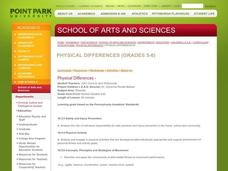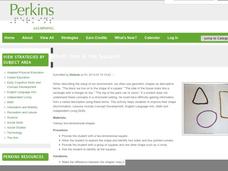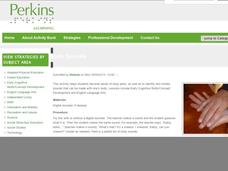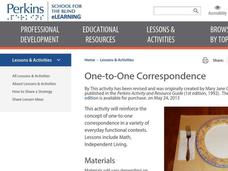Curated OER
Eugenics Worksheet
Students become familiar with the vocabulary associated with treatment of disabilities. In this Eugenics instructional activity, students complete a worksheet on Eugenics and discuss the treatment of people with disabilities in the past...
Curated OER
Recruiting Help to Attain Personal Goals
At one time or another, people with physical disabilities may require the assistance of others in the community. Here, they engage in one-on-one role-playing sessions to practice recruiting assistance in the community. They practice...
Autism New Jersey
Autism Awareness
Have your class inquire about learning disabilities by identifying their own capabilities. They discuss their interests and hobbies and identify that not everyone has the same skill set now or anytime in the future. They listen as the...
Curated OER
Religion and Ethics: Living with Special Needs
Students explore human behavior by exploring mental and physical disabilities. In this learning disability lesson plan, students identify the different disabilities students have which prevent them from working at the same pace as the...
Curated OER
Diversity
Students access prior knowledge of the five senses and relate to students with disabilities. In this people with disabilities lesson, students research and use a Venn diagram to compare and contrast famous people and their...
Curated OER
English Grammar Help, How to Write Correct Sentences
Here is a neat way to promote independence in your learners with dyslexia. Learners can access this resource for quick tips in writing complete, grammatically correct sentences. It's like a cheat sheet kids can use on their own. To...
Curated OER
Lesson 5- Symme "trees": Understanding Same
Pairs of socks can be the same and they can be different. Use socks to emphasise the meanings of the words same and different. Your special ed class will examine each pair of socks you provide to determine if they are the same or...
Curated OER
Private & Public
Some disabled students have a difficulty understanding what is and what is not publicly appropriate behavior. Help them build healthy social skills by defining public and private behaviors, labeling public and private places, and...
Curated OER
Using Poetry in Teaching Reading to Special Education Students
A series of well-written activities, these lessons prompt middle schoolers reading below grade level (at a second, third, or fourth grade level) to use poetry to practice basic reading skills. They rhyme, build words, make inferences,...
Perkins School for the Blind
Where Shall I Put It?
Position and positional phrases are concepts that need to be constructed for learners with low or no vision. Help them gain competence and a conceptual understanding of words like on, in, and under with a funny game. After gathering a...
Perkins School for the Blind
Which One is the Square?
Children who are blind need to constantly be engaged in building conceptual understandings of the world around them. This activity will help them grasp the concept of shape, identify shapes, and consider shapes as they are used to...
Curated OER
Seeing the World Through A Different Lens
Young scholars participate in activities in which they model different disabilities. They discuss their experiences as a class. They work together in groups to discuss how to improve an adaptive device.
Curated OER
A Differentiated Art Lesson Plan Based on the Work of Andy Warhol
While this lesson plan isn't incredibly extensive, it does provide a base on which one can build a differentiated learning experience. Video, discussion, and visuals are used to assist learners in understanding the elements of art and...
Perkins School for the Blind
Beginning Map Skills
Maps can be so much fun, they help you understand spatial relationships, distance between objects, and can foster direction skills. Budding cartographers with visual impairments use the Wheatley Tactile Diagramming Kit to create their...
Curated OER
Autism and Autism Spectrum Disorders: Disorders Extending Beyond the "Norm"
Learners develop an understanding of autism by engaging in an inquiry-based discussion. Pupils are exposed to the vast array of defining characteristics of autism spectrum disorders. They create posters about the developmental...
Perkins School for the Blind
The Function of Villi in the Small Intestine
Ever wonder what the villi in the small intestine do? I bet your class would love to find out. Mesh netting is used to represent small blood vessels on the outside of the intestine, and a chenille bath mat is used to represent the villi...
Perkins School for the Blind
Personal Information
"Hi, how are you? My name is___." Seems simple enough but it's not always that easy to recall and relate factual information about yourself. Learners with multiple disabilities practice memorizing and relaying personal information about...
Perkins School for the Blind
Telephone Skills
What kid doesn't love talking on the phone? Learners with visual and intellectual disabilities get comfortable using several types of telephones. They begin by examining the phone, dialing, answering the phone, and then they work into...
Perkins School for the Blind
Learning to Identify Sounds Made by the Body
Sneeze, snap, tap, and whistle; Did I do that? Explore the parts and sounds of the human body with your learners with visual impairments. First you'll name the parts of the body, make a sound with each part, and then have the class guess...
Curated OER
Autism And The Brain
Help your class understand Autism. They conduct research into how the brain is effected by the disorder of autism. Then they write a letter to the Center For Disease Control about their findings and forward some of the new research to them.
Perkins School for the Blind
One-to-One Correspondence
Here is an interesting way to build concept understanding regarding one-to-one correspondence. Learners with visual impairments will use an array of everyday objects in context to foster an understanding of what one-to-one correspondence...
Perkins School for the Blind
Volume, Mass, and Density Boxes
Mass and density are difficult topics for kids to understand, and even more difficult when you have visual impairments or blindness. Learners will make boxes and fill them with cotton, sand, or crushed paper. They will feel the density...
Curated OER
Home Living / Daily Living: Safety Terms
Being able to recognize safety signs in your environment is a great start to staying safe. Kids with severe to moderate disabilities work to recognize and identify safety terms and signs. They use flashcards and decreasing prompts to...
Curated OER
Home Living / Daily Living Lesson Plan—Mastery Healthy Food
Everyone needs to know how to eat well to stay healthy. Learners with mild disabilities log what they eat, discuss food choices, and review healthy foods. The lesson could be used to foster living skills in high-functioning individuals...

























